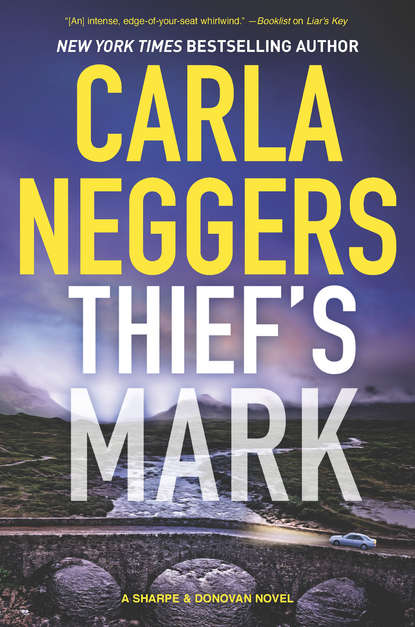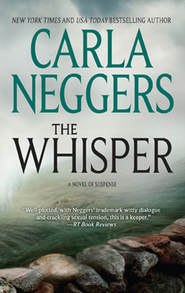По всем вопросам обращайтесь на: info@litportal.ru
(©) 2003-2024.
✖
Thief's Mark
Автор
Год написания книги
2019
Настройки чтения
Размер шрифта
Высота строк
Поля
“He did not. I wish we’d run into arms traffickers. They’re more straightforward than Oliver York.”
“But nowhere near as charming.”
* * *
A few minutes later, they were on the road, heading west to the rolling hills and classic honey-stone villages of the picturesque Cotswolds. Colin was doing the driving. Emma was preoccupied, thinking about Oliver’s call. “You know this has something to do with the break-in at Granddad’s.”
“What do you want to do?”
“I left him a voice mail. I left Lucas a voice mail, too. I’ll try Granddad again.”
She was almost surprised when he answered. “Emma,” he said. “You’re in London?”
“Just landed. What are you up to?”
“Contemplating finding a hardware store to fix my broken window.”
That didn’t sound suspicious, and there was nothing suspicious about his tone. “Has Oliver York been in touch by any chance?”
“No.” A pause. “Why?”
“Something’s happened. I’m not sure what I can tell you at this point. Let me know or let the gardai know if Oliver gets in touch. And keep your doors locked.”
“Don’t talk to strangers and drink my milk. Got it.”
“Granddad...”
“It’s okay. I can tell whatever’s going on is bad.”
“I just want you to stay safe.”
“Always,” he said.
Colin glanced at her after she’d hung up. “First day back on the job,” he said.
She stared out the window at the busy motorway. “It’s going to be a long one.”
4 (#u951240e0-74d3-5ee9-b773-8a019319d286)
Near Stow-on-the-Wold, the Cotswolds, England
Henrietta walked home after the police finished with her. They’d blocked off entrances onto the York property, including the lane that ran past the dovecote potting shed and was part of a waymarked trail. Walkers out for the day, unaware of the events that morning, would have to take a detour, at least until the scene was cleared. Henrietta had witnessed deaths and seen corpses in her previous life but never one involving a childhood playmate as a witness—a man as enigmatic, frustrating, larcenous, tortured and sexy as Oliver York.
He was maddening, and he was the reason she had quit MI5.
That was the short answer, at least.
She continued along a dry wall, constructed God knew when, of the region’s ubiquitous yellow limestone. Oolitic Jurassic limestone, it was called. She’d thought she’d needed to know that as a garden designer, but no one had yet to ask. She wasn’t concerned about running into a mad killer. The police hadn’t been, either. She’d take care, of course, but whatever had happened behind her at the York farm, it hadn’t been random.
She crossed a bridge over the same shallow stream that ran behind the York dovecote. The paved lane would eventually take her into the village, but she needn’t go that far—never mind the temptation to. It’d been a day. She’d love nothing better than to spend the rest of it at the pub.
Instead she turned onto a narrow lane, lined with more honey-stone walls, and came to what was still known as the Balfour farm. Her great-grandparents had purchased it in 1909 as a country home and working sheep farm. They’d proceeded to have three children—Freddy, Posey and Anthony—and had left the entire property to Freddy, the eldest Balfour and only surviving son, Anthony having died young. Freddy had promptly turned over most of the acreage to tenant farmers. He’d spent holidays—not every holiday—at the house and let friends and colleagues use it for getaways, but he’d never had a great affinity for the Cotswolds or country life. Surprisingly, he’d moved to the farm after he lost his wife to a stroke. Widowed, his only son busy with his own life in London, Freddy had enjoyed several good years before he developed lung cancer and died in his Cotswolds sitting room at age seventy-seven. Henrietta had been only five, but she remembered him, her chain-smoking grandfather with the kind eyes. She hadn’t known then, of course, that Freddy Balfour was an MI5 legend and British hero. That had come later.
Posey Balfour had fallen in love with the Cotswolds as a young girl and couldn’t imagine living anywhere else. The family had carved out a lot for her, and she’d built her own home, where she’d stayed, content, for the next seventy years. Henrietta’s father had sold the rest of the original farm after Freddy’s death. As far as she knew her dad had never considered keeping it.
She came to her great-aunt’s house.
My house now.
She was relieved to see only her Mini and not Oliver’s Rolls-Royce in the drive.
A silly thought, that he might have come here.
“Blast it, Oliver, where are you?”
Normally she would drive to work in order to haul tools, pots, seedlings, bags of soil and supplies—her Mini amazed her with its hauling capacity—but that morning she’d walked. She’d been working at the York farm for two weeks straight and had everything she needed there. The day had started with sunshine, but she enjoyed walking even in less-than-lovely weather.
She felt tense as she unlocked her front door. After twelve years with MI5, she liked to think objectivity and emotional distance had become natural for her. She’d managed in the midst of the crisis, with Ruthie Burns in a state and Martin Hambly about to have a stroke, but now, on her own, she was anything but objective and distant. It wasn’t that she was out of practice. She’d only left MI5 in March. It was that today involved people she’d known her entire life. Friends, neighbors, villagers.
Oliver.
She fumbled with the door lock. His fault, damn him.
She got the door open and felt her tension ease the moment she crossed the threshold. Posey had died in her sleep of general organ failure at ninety-four and left the house to Henrietta and small inheritances to Henrietta’s father and his cousin, Anthony’s only son.
Posey would have relished a mysterious death in the village, provided it wasn’t too gruesome and involved someone who’d had it coming. Henrietta had yet to figure out what to do with her great-aunt’s daunting collection of cozy mysteries. They lined the study shelves and filled more than one cupboard.
She went back to the kitchen and filled the kettle with water and set it to boil. In addition to the kitchen, the house consisted of a sitting room, study and powder room on the ground floor, and, upstairs, two slanted-ceiling, dormered bedrooms and a bathroom. Posey had had the house built to her standard. She’d decided on new construction rather than selling the lot and buying an existing house. She would never have had the patience to fuss with anything listed or mildly historic that would require her to follow rules and regulations and entertain unsolicited opinions from villagers. “I didn’t want my house to be the subject of postcards, tourist photographs or chocolate boxes,” she’d told Henrietta more than once.
Posey hadn’t cleared out a single possession before her death. Henrietta knew she needed to get on with sorting what didn’t suit her. Sell it, give it away, toss it. It seemed like a daunting process at the moment. Of course, it wasn’t. Surveillance and penetration of a violent cell bent on mass murder were daunting. Deciding what to do with Aunt Posey’s stacks of murder mysteries was emotionally challenging but hardly the same.
As she waited for the kettle to boil, Henrietta gazed out the kitchen window at the glorious June blossoms. As plain as the house was, the gardens were incredible. They were Posey’s creation and had been her greatest joy. Pink foxglove, cobalt-blue delphinium, white daisies, artfully placed grasses—Henrietta let the burst of color soothe her. In the months since her great-aunt’s death, she had maintained the gardens, at least to a degree, without touching their essential structure. The rose trellis needed replacing. Most of the perennials needed thinning and a good chop. She’d get to it all one of these days.
How far would Oliver get in his Rolls-Royce? It wasn’t an inconspicuous vehicle.
Henrietta shook off the intrusive thought but she couldn’t ignore a tug of emotion. She’d felt it before—this unexpected, unwilling attraction to Oliver. They’d known each other since childhood and she hadn’t felt anything remotely romantic toward him until last Christmas. She’d tried to blame winter for her sudden, uncomfortable feelings—the short days, the gray, the damp—and when that hadn’t worked, she’d tried to blame grief and nostalgia given Posey’s recent death. She’d looked up Oliver in London after the new year and joined him for a drink at Claridge’s, his favorite spot, thinking that would do the trick. He’d be back to being the Oliver who’d always been there—dashing, good-looking, solitary, a man coping with unspeakable tragedy, but not anyone she could imagine sleeping with.
But that hadn’t happened.
Henrietta wasn’t sure what to call how she felt. She’d been out of touch with anything resembling a romantic life or romantic feelings for so long, how was she supposed to know? She wasn’t in love with him, she kept telling herself. Oliver was irresistibly fascinating, with his knowledge of mythology, folklore and legends, and his unusual lifestyle. Given his expertise in karate and tai chi, he was fit and capable.
Sexy, in fact. That was the truth of it.
Maybe what she felt was simple lust. Maybe she just wanted to sleep with him and once she did, that’d be that.
“The man’s a bloody thief,” she said aloud, getting the teapot off an open shelf. It was hers, although Posey had left a half-dozen teapots. She needed a few things of her own in her new life.
In a way, learning Oliver was a serial art thief had somehow permitted her to indulge in these fantasies about him. His eccentricities and solitary ways kept people at bay. They didn’t ask questions about the true nature of his hobbies and travels.











